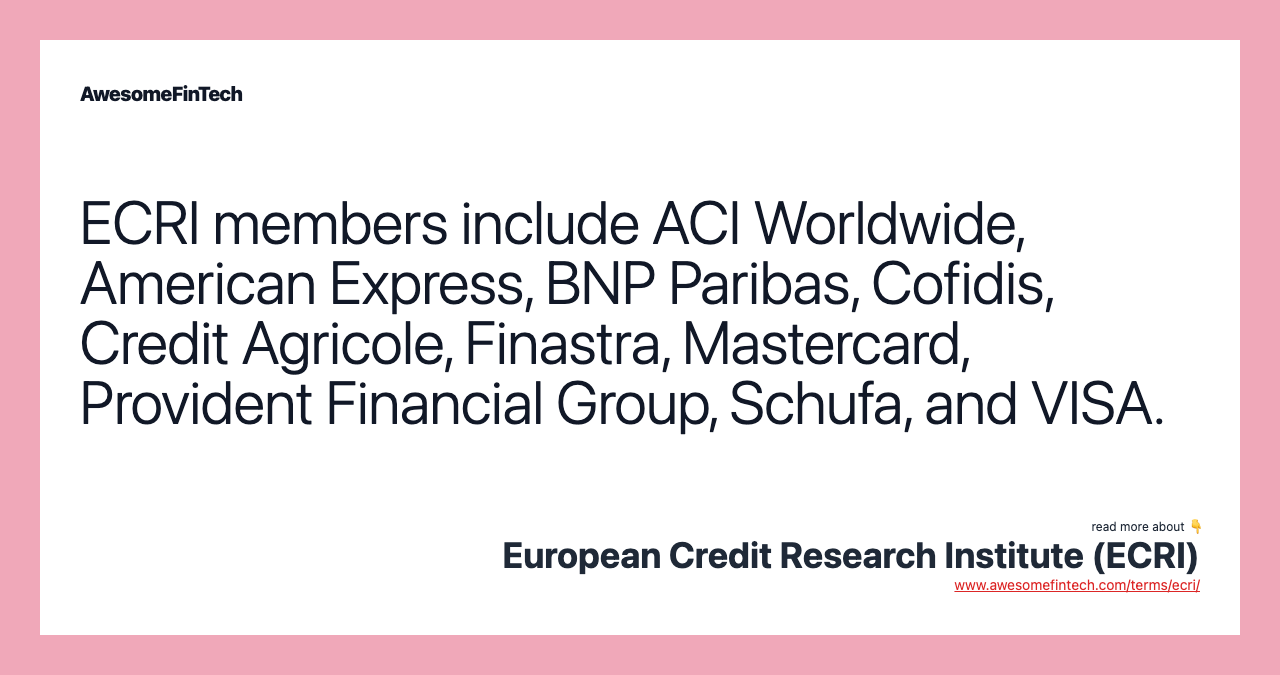European Credit Research Institute (ECRI)
The European Credit Research Institute (ECRI) is a policy institute focused on research and advocacy in retail finance and financial technology in Europe. The European Credit Research Institute (ECRI) is an independent, non-profit policy research institute, established by a consortium of European financial institutions in 1999 to provide analysis of the European retail financial services landscape. The European Credit Research Institute (ECRI) is a policy institute in Europe that provides research, analysis, and advocacy on the retail finance and financial technology markets in Europe. ECRI publishes a host of newsletters, white papers, reports, policy briefs, and commentaries for both financial industry constituents and the general public regarding all aspects of retail financial services in Europe, including regulation, fintech, responsible lending practices, credit reporting, and consumer credit and protection. ECRI also hosts conferences, seminars, and workshops that provide forums for industry members, academics, consumer advocates, and government representatives to discuss and debate aspects of current and emerging European financial policy.

What Is the European Credit Research Institute (ECRI)?
The European Credit Research Institute (ECRI) is a policy institute focused on research and advocacy in retail finance and financial technology in Europe. The ECRI provides analysis and insight on all topics related to the consumer financial services markets in Europe.







Understanding the European Credit Research Institute (ECRI)
The European Credit Research Institute (ECRI) is an independent, non-profit policy research institute, established by a consortium of European financial institutions in 1999 to provide analysis of the European retail financial services landscape.
Since its founding, ECRI developed a reputation for being a key objective observer of the industry and a primary resource for analysis, forecasting, and insight into the structure and evolution of European retail financial services markets. For instance, ECRI issued warnings well ahead of the 2008 financial collapse.
To this end, ECRI maintains databases to provide reliable and timely data to legislators, regulators, academics, and industry members regarding current regulations, legislation, technology, and finance industry performance.
ECRI publishes a host of newsletters, white papers, reports, policy briefs, and commentaries for both financial industry constituents and the general public regarding all aspects of retail financial services in Europe, including regulation, fintech, responsible lending practices, credit reporting, and consumer credit and protection.
ECRI also hosts conferences, seminars, and workshops that provide forums for industry members, academics, consumer advocates, and government representatives to discuss and debate aspects of current and emerging European financial policy.
The European Credit Research Institute (ECRI) is based out of Brussels, as much of the governing body of the European Union is. The current president of the ECRI is Isabelle Guittard-Losay, who is also the Head of Institutional Relationship at BNP Paribas Personal Finance. The remaining members of the board of directors are made up of individuals from the other member companies.
European Credit Research Institute (ECRI) and the Centre for European Policy Studies (CEPS)
Operations and staffing of the ECRI are managed by the Centre for European Policy Studies (CEPS), and funding for operations is supplied by a combination of fees for research and membership fees from member organizations. As of May 2021, ECRI members include ACI Worldwide, American Express, BNP Paribas Personal Finance, Cofidis, Credit Agricole, Finastra, Mastercard, Provident Financial Group, Schufa, and VISA. Corporate membership costs 12,000 euros per year.
CEPS was established in 1983 in Brussels as an impartial think tank devoted to policy research and academic excellence in exploring economic and political challenges facing Europe. CEPS maintains several programs and initiatives and engages a number of international collaborations, including the European Network for Economic and Fiscal Policy Research, the European Network of Economic Policy Research Institutes, and the Council of Councils.
CEPS co-produces the European policy journal Intereconomics and hosts the annual CEPS Ideas Lab, which brings together think tanks across Europe each year to address key European policy issues.
CEPS also operates the European Capital Markets Institute (ECMI). Similar to ECRI in many ways, this sister organization conducts policy research on issues regarding European capital markets and also provides publications and forums for stakeholders in this arena.
Additionally, CEPS provides advanced academic activities in European policy for graduate and post-graduate students and stakeholders, as well as ongoing policy research regarding cybersecurity and the European Commission’s Digital Single Market strategy.
Related terms:
Board of Directors (B of D)
A board of directors (B of D) is a group of individuals elected to represent shareholders and establish and support the execution of management policies. read more
Consumer Bankers Association (CBA)
The Consumer Bankers Association (CBA) is a U.S. trade organization representing financial institutions offering retail lending products and services. read more
Consumer Credit
Consumer credit is personal debt taken on to purchase goods and services. Credit may be extended as an installment loan or a revolving line of credit. read more
Cybersecurity
Cybersecurity refers to the measures taken to keep electronic information, as well as hardware and software, private and safe from damage or theft. read more
European Capital Markets Institute (ECMI)
The European Capital Markets Institute (ECMI) is an independent think-tank focusing on research in European capital markets. read more
Economic Think Tank
An economic think tank is an organization whose mission is to study and reflect on economic issues. read more
European Sovereign Debt Crisis
The European debt crisis refers to the struggle faced by Eurozone countries in paying off debts they had accumulated over decades. It began in 2008 and peaked between 2010 and 2012. read more
Feasibility Study : How Does It Work?
A feasibility study analyzes all relevant factors of a project to determine the possibility and probability of completing it successfully. read more
Financial Institutions and Prudential Policy (FIPP) Unit
Financial Institutions and Prudential Policy (FIPP) Unit is a research division within the Centre for European Policy Studies. read more
Futures Industry Association (FIA)
The Futures Industry Association (FIA) is a global group of futures professionals. It educates and lobbies on issues relating to markets and trading. read more